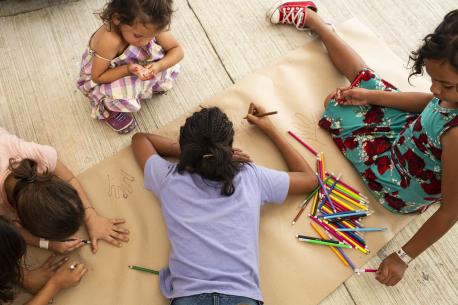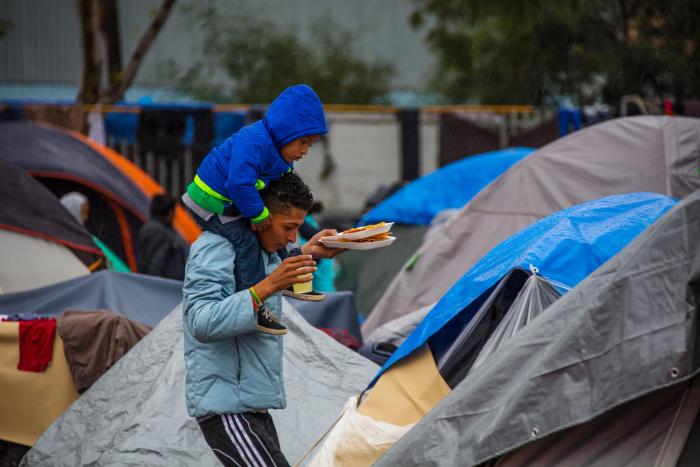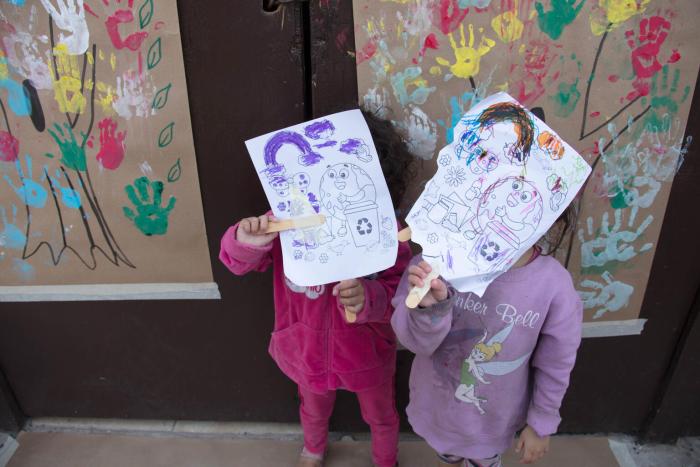
The LatinX Factor – The Power of the LatinX Community
National Hispanic Heritage Month recognizes the generations of Hispanic Americans who enrich our country through their diverse culture and contributions.
National Hispanic Heritage Month (September 15-October 15) is a key period when the United States recognizes the generations of Hispanic Americans who enrich our country through their diverse culture and contributions. This time of year allows us to focus on the customs, language and history of an important community that represents almost 20 percent of the total population in the United States. The Diaspora and Multicultural team at UNICEF USA is especially eager to recognize Hispanic Heritage Month and our most prominent partnership with Hispanic Federation that has resulted from our connections to the Latin American community.
According to the 2020 U.S. Census, there are 62 million Hispanics living in the U.S. They are the second largest minority group of the U.S. population. The Statista research department projects there will be over 110 million people of Hispanic descent in the U.S. by 2060.
Such compelling data about the Hispanic American population show the importance and often overlooked power of this community. Hispanic Heritage Month is truly a time to reflect on the past and the potential.
“U.S. Latinos are making America younger, more entrepreneurial, more likely to be employed and increasingly affluent. They are contributing disproportionally to America’s productivity and economic growth. The Latino Factor is a critical driver of America’s New Mainstream Economy.” — L'Attitude, a national Latino cohort and think-tank platform
It is in this spirit that the Diaspora and Multicultural team at UNICEF USA recognizes the tremendous force of the Hispanic community, in particular how this special community comes together to help the most vulnerable children in the region.

Families from a migrant caravan making its way from Central America to the United States prepare to leave a tent city for a temporary shelter in Tijuana, Baja California state, Mexico. © UNICEF/UN0271799/Kelly
Across Latin America, the COVID-19 pandemic has led to rising unemployment and many other impacts that have pushed millions into poverty, increasing the number of people who rely on humanitarian services to survive. In Nicaragua, UNICEF is providing essential WASH supplies for schools, rehabilitating infrastructure and promoting hygiene practices. In Argentina, Bolivia and the Dominican Republic, UNICEF is continuing to assist blended learning modalities, support connectivity, distribute learning materials and train teachers. In Cuba, UNICEF is supporting health care facilities to provide quality services for women and children and undernutrition prevention.
UNICEF is also addressing the effects from back-to-back Hurricanes Eta and Iota. Guatemala, Honduras and Nicaragua have been the most affected, with more than 5.3 million people in need of assistance, including 1.8 million children. UNICEF is prioritizing responses to these emergencies through nutrition, health, WASH and education programming.
UNICEF’s most critical programs in Latin America focus on the migration border crisis. Currently, migrating families and unaccompanied children, mostly from Central America, are fleeing extreme violence, poverty and discrimination. Along the northern Mexican border, the Migration Protection Protocols have forced more than 70,000 asylum-seekers to wait out their asylum process in Mexico. As the numbers of incoming migrant families have increased in recent years, migration policies both in the U.S. and in Mexico have become stricter and often fail to uphold the human rights of migrants.
Unfortunately, children are the ones that suffer the most. Upon their arrival in the U.S or Mexico, children are often placed into detention centers or large-scale shelters that do not meet their needs. COVID-19 has added pressure to an already harrowing situation. According to UNICEF studies: since the start of 2021, the number of migrant children reported in Mexico has increased sharply from 380 to nearly 3,500, announced Jean Gough, UNICEF Regional Director for Latin America and the Caribbean, after wrapping up a 5-day visit to Mexico, including stops along its northern border with the United States. Currently, an average of 275 additional migrant children find themselves in Mexico every day, after being detected by the Mexican authorities, waiting to cross into the U.S. or being returned.
To support the needs of migrant children and their families, UNICEF USA and the Hispanic Federation have entered into a partnership which will be integral to meeting these challenges. This partnership promises to address the needs of migrant children and families, refugees and asylum seekers in the U.S. and Mexico by providing psychosocial support, case management and capacity building for shelters. With appropriate care and legal services, migrant children will have a chance at normalcy following dangerous migration journeys or situations at home.
UNICEF USA believes that every child deserves to feel safe and protected. Hispanic Heritage Month is an opportunity to highlight the needs of populations of Hispanic descent as well as to build on the strength that comes when we unify to become a catalyst for change in the region.

Children show their drawings in a UNICEF-supported shelter for migrant families, Roca de Salvación, in Tijuana, Baja California, Mexico, on April 14, 2021. NGO La Jugarreta provides psychosocial support activities for children at the shelter. The artwork pictured here reflects the week’s theme, “caring for the environment.”
“I was heartbroken to see the suffering of so many young children, including babies, at the Mexican border with the U.S.,” said Jean Gough, UNICEF Regional Director in Latin America and the Caribbean. “Most of the shelter facilities I visited in Mexico are already overcrowded and cannot accommodate the increasing number of children and families migrating northward. We are deeply concerned that living conditions for migrant children and mothers in Mexico could soon deteriorate further.” © UNICEF/UN0443697/Kelly
UNICEF has helped save more children’s lives than any other humanitarian organization by providing health care and immunizations, safe water and sanitation, nutrition, education, emergency relief and more across 190 countries. UNICEF USA supports UNICEF’s work through fundraising, advocacy and education in the United States. The Hispanic Federation is a membership and advocacy organization with a mission to empower and advance the Hispanic community focusing on low-income, marginalized and immigrant Latinos.
UNICEF USA and the Hispanic Foundation will host a webinar to highlight our partnership in support of migrant children. Please join us on October 5, 2021 at 2 PM ET.
For more information, please reach out to:
Arantxa Moreno – UNICEF USA
Manager of Diaspora and Multicultural Partnerships
amoreno@unicefusa.org
202-802-9106
Top Photo: Migrant children awaiting their humanitarian visas draw at the UNICEF-supported Child-Friendly Space at the Mexico-Guatemala border in Ciudad Hidalgo, Mexico. © UNICEF/UN0278777/Bindra


